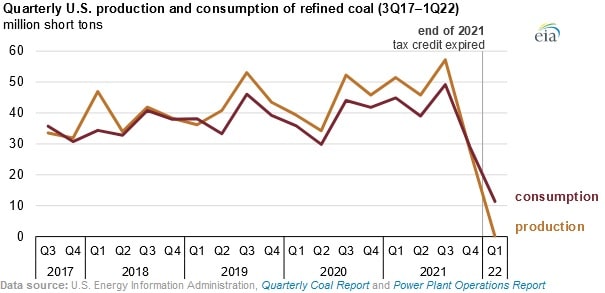U.S. Refined Coal Production and Consumption Fall as Tax Credit Expires: EIA

U.S. refined coal production declined to almost zero during the first quarter of 2022, according to a July 20 report from the U.S. Energy Information Administration. Refined coal consumption in the U.S. during the first quarter of 2022, held a 10 percent share of coal fired electricity generation, significantly lower than then 31 percent share in 2021. The reduction in both refined coal production and consumption can be attributed to the expiration (end of 2021) of the refined coal production tax credit.
As part of the refined coal production process, additives are utilized to aid in capturing emissions when the coal is burnt. The production tax credit assisted coal electric power plants reduce emissions, such as mercury oxides and therefore provided them with an incentive to produce. The refined coal production tax credit, created by the American Jobs Creation Act of 2004, helped refined coal production facilities claim the tax credit for up to 10 years, based on three key conditions. The first condition required power plants to begin use by December 2011, the second condition meant that power plants had to verify that they lowered nitrogen oxide emissions by 20 percent and cut 40 percent emissions for either sulphur dioxide or mercury in comparison with with feedstock coal. The last condition prohibited the power plant from selling the refined coal to a disparate body.
The tax credit was created and designed to consider inflation and as of 2021 the credit value was $7.38 per short ton, an increase from $4.38 in 2012. The tax credit incentivized both refined coal production and consumption, and according to a U.S. Government Accountability Office audit report, refined coal producers pocketed around $8.9 billion in tax credits between 2010 and 2020.
EnerKnol Pulses like this one are powered by the EnerKnol Platform—the first comprehensive database for real-time energy policy tracking. Sign up for a free trial below for access to key regulatory data and deep industry insights across the energy spectrum.
ACCESS FREE TRIAL